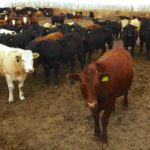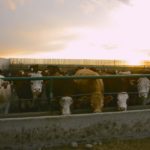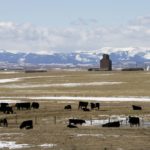Compared to last week, western Canadian feeder cattle sold $4-$6 lower on average. Feedlot operators backed away from the markets due to stronger feed grain prices and weakness south of the border. Certain regions of the U.S. Midwest and southern Plains have experienced adverse weather, which caused U.S. feeder cattle prices to experience a week-over-week […] Read more

Klassen: Feeder market experiences softer demand

The big wheel keeps on turning
Reading Time: < 1 minute In a perfect world, supply would equal demand and everything would balance out. But it’s not a perfect world, which is why there’s something that Brenna Grant of Canfax calls a “biological-economic phenomenon influenced by production, prices, and profits.” This is the cattle cycle. It starts when demand spikes for one reason or another, and […] Read more

Alberta beef remains in high demand
Reading Time: < 1 minute Beef production in Alberta rose by an estimated five per cent last year to just over 732,000 tonnes, says a provincial livestock market analyst. One-sixth of that amount was consumed in Alberta, another 51 per cent was sold in Canada, and just under a quarter went to the U.S., said Jason Wood. The remainder (8.4 […] Read more

Klassen: Strong demand drives yearlings higher
Compared to last week, western Canadian yearling markets traded $2-$3 higher, with quality packages advancing $4-$6. Feedlot operators shrugged off the weaker live cattle futures as feed grain prices came under pressure. Cattle brokers were carrying a full deck of orders, which allowed for limited slippage. Feedlots are anxious to secure ownership early in the […] Read more

Klassen: Rising feed grain prices weigh on feeder market
Western Canadian yearling prices were relatively unchanged from week-ago levels; however, feeder cattle fit for grass and calves dropped $4 to as much as $10 from seven days earlier. Rising feed grain costs appear to be affecting lighter weight categories more than the yearling market. Feedlots will be struggling with negative margins through the summer […] Read more

McDonald’s sets greenhouse gas reduction targets
Reuters — McDonald’s Corp. on Tuesday announced what it describes as an approved, science-based target to cut greenhouse gas emissions and battle climate change, saying it is the first restaurant company to do so. Under a plan several years in the making, the fast-food company — along with its franchisees and suppliers — aims to […] Read more
Klassen: Feeder market sends mixed signals
Compared to last week, western Canadian average yearling prices were steady to $3 lower while heavier replacements above 1,000 lbs. actively traded $3 to as much as $6 lower. Weakness in deferred live cattle futures, along with rising feed grain prices, caused buyers to lower their bids accordingly. Steers averaging 1,000 lbs. were readily trading […] Read more

Cattle aren’t actually killing the planet, says vegetarian rancher
Livestock’s environmental impact is complicated but done right, it’s good for the planet, says author
Reading Time: 4 minutes It’s become accepted wisdom that cattle production is worse for the environment than gas-guzzling SUVs — but it’s not true. “We’re told over and over again that cattle are bad for the environment and, therefore, everybody should eat less beef,” said Nicolette Hahn Niman, author of Defending Beef: The Case for Sustainable Meat Production. “We’re […] Read more

Klassen: Winter weather weighs on feeder complex
Compared to last week, western Canadian feeder cattle prices were relatively unchanged. However, quality features played a larger role in the price structure. Buyers shied away on fleshier yearlings which is often the case when margins move into negative territory. It’s that time of year when thicker coats can be somewhat misleading and buyers pulled […] Read more

Video offers ranchers’ side of the environmental story
Reading Time: < 1 minute Alberta’s Kelly Hall and Hugh Lynch-Staunton are among the ranchers featured in a new video on environmental sustainability from the Beef Cattle Research Council. “What beef producers need to know about environmental footprint” offers both a cinematic look at Canadian cattle production and the sector’s response to its critics. Hall, Lynch-Staunton, and three Ontario cattle […] Read more

